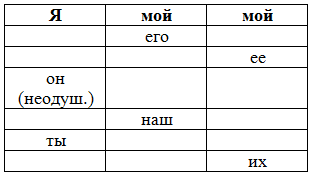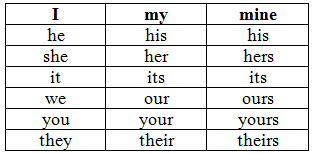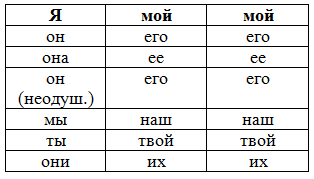Ответы к разделу III. Use of English+
13. A. Complete the sentences as in the example. Завершите предложения, как в примере.

Example: I am Helen. My house is not in Apple Street. Mine is in South Street. Пример: Я − Елена. Мой дом не на Яблочной улице. Мой находится на Южной улице.
1) His name is Ron. His car is not new. _ is old and not very good.
2) They are brothers. Their parents are not George and Meg. _ are Steve and Alice.
3) We are tourists. Our hotel is not Victoria Hotel. _ is Seaside Hotel.
4) I’m a pupil. My school is not big. _ is small but comfortable and good.
5) You are my friend. Your desk in the classroom is not far from my desk. _ is near _ .
6) She has a pet. Her pet is not a rabbit. _ is a guinea pig.
Ответ:
1) His name is Ron. His car is not new. His is old and not very good.
2) They are brothers. Their parents are not George and Meg. Theirs are Steve and Alice.
3) We are tourists. Our hotel is not Victoria Hotel. Ours is Seaside Hotel.
4) I’m a pupil. My school is not big. Mine is small but comfortable and good.
5) You are my friend. Your desk in the classroom is not far from my desk. Yours is near mine.
6) She has a pet. Her pet is not a rabbit. Hers is a guinea pig.
Перевод:
1) Его зовут Рон. Его машина не новая. Его - старая и не очень хорошая.
2) Они − братья. Их родители не Джордж и Мег. Их − Стив и Алиса.
3) Мы − туристы. Наш отель не Виктория. Наш − Приморский Отель.
4) Я − ученик. Моя школа не большая. Моя маленькая, но удобная и хорошая.
5) Ты мой друг. Твой стол в классе недалеко от моего стола. Твой рядом с моим.
6) У нее есть домашнее животное. Ее питомец не кролик. Это ее морская свинка.
B. Complete the chart. Заполните таблицу.
B.
14. Circle the right words in brackets to complete the sentences. Обведите нужные слова в скобках, чтобы завершить предложения.
Ответ:
1) He (says/tells) I can’t miss the railway station.
2) The teacher who is standing at the blackboard says, “(Come/Go) to the blackboard, Andrew.”
3) (Sorry, Excuse me), is there a bank near here?
4) The airport is (far/near) from the city centre.
5) Oxford is a university city. (Its/It’s) colleges are famous all over the world.
6) I am standing at the cinema. There is a hotel on my right and there’s a supermarket on my left. The cinema is (opposite/between) them.
7) John spoke to me very (cold/coldly) in the morning.
8) Jane is in the living room, she says, “(Come/Go) in, Victor. It’s so warm and pleasant (inside/outside).”
9) (Which/What) cities in France do you know? (Возможны оба варианта. Which применяется обычно тогда, когда выбор ограничен, а у нас он как раз ограничен Францией. What так же можно применить, потому что не задан список городов.)
10) (Which/Who) of you lives in St Petersburg?
Перевод:
1) Он говорит, что я не могу пропустить железнодорожную станцию.
2) Учитель, стоящий у доски, говорит: «Подойди к доске, Андрей».
3) Извините, здесь есть банк?
4) Аэропорт находится далеко от центра города.
5) Оксфорд − университетский город. Его колледжи известны во всем мире.
6) Я стою в кинотеатре. Справа от меня находится отель, а слева − супермаркет. Кинотеатр между ними.
7) Джон говорил со мной очень холодно по утрам.
8) Джейн в гостиной, она говорит: «Входите, Виктор. Внутри так тепло и приятно».
9) Какие города во Франции вы знаете?
10) Кто из вас живет в Санкт−Петербурге?
15. Use what, which, who to complete the sentences. Используйте what − что, which − который, who – кто, чтобы завершить предложения.
Ответ:
1) What is the name of the river on which Paris stands?
2) What is there in the room next to the sofa?
3) I don’t know the girl who is sitting opposite your cousin.
4) Who of you is going for a walk with us?
5) They showed me their garden, I showed them mine. I can’t say which of them is more beautiful.
6) Who lives at 48, Apple Street?
7) Who of them is going to meet me at the airport?
8) What continents do you know?
9) My book is about our trip to South Africa, his book is about his trip to South America. Which book would you like to read?
10) − Linda, who is that man near the window? Do you know him?
Перевод ответа:
1) Как называется река, на которой стоит Париж?
2) Что там в комнате рядом с диваном?
3) Я не знаю девушку, которая сидит напротив твоей кузины.
4) Кто из вас собирается гулять с нами?
5) Они показали мне свой сад, я показал им свой. Я не могу сказать, какой из них красивее.
6) Кто живет на 48, Apple Street?
7) Кто из них встретит меня в аэропорту?
8) Какие континенты вы знаете?
9) Моя книга о нашей поездке в Южную Африку, его книга о его поездке в Южную Америку. Какую книгу вы хотели бы прочитать?
10) − Линда, кто этот человек у окна? Ты знаешь его?
16. Look at the map of England and Wales and say what cities are situated in the north, in the south, in the east and in the west of the country? Посмотрите на карту Англии и Уэльса и скажите, какие города расположены на севере, юге, востоке и западе страны?
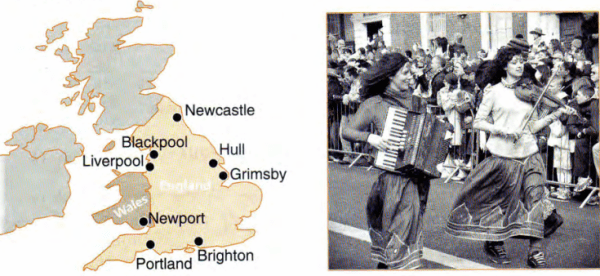
Ответ:
Newcastle is situated in the north of the country.
Blackpool, Liverpool and Newport are situated in the west of the country.
Hull and Grimsby are situated in the east of the country.
Portland and Brighton are situated in the south of the country.
Перевод ответа:
Ньюкасл расположен на севере страны.
Блэкпул, Ливерпуль и Ньюпорт расположены на западе страны.
Халл и Гримсби расположены на востоке страны.
Портленд и Брайтон расположены на юге страны.
17. Ask Jim questions about the trip to Moscow he had last summer. Задайте Джиму вопросы о поездке в Москву прошлым летом.
You want to know: Ты хочешь знать:
1) when he went there − когда он туда ездил −
2) with whom he was on that trip − с кем он был в этой поездке −
3) where he stayed − где он останавливался −
4) what he saw − что он видел −
5) who he met − кого он встретил −
6) what the people were like − какими были люди −
7) what the weather was like − какая была погода −
8) which of the places he liked most of all − какое из мест ему понравилось больше всего −
Ответ:
1) When did you go there?
2) Who were you on that trip with? / With whom were you on that trip?
3) Where did you stay?
4) What did you see?
5) Who did you meet?
6) What were the people like?
7) What was the weather like?
8) Which of the places did you like most of all?
Перевод ответа:
1) Когда ты ездил туда?
2) С кем ты был в этой поездке?
3) Где ты останавливался?
4) Что ты видел?
5) С кем ты познакомился?
6) Какими были люди?
7) Какая была погода?
8) Какое из мест вам понравилось больше всего?
18. Complete the disjunctive questions and answer them. Закончите разделительные вопросы и ответьте на них.
Запомните: если в первой части предложение утвердительное, то в разделительном вопросе ставится отрицание. never считается за отрицание. do, did или does - зависит от времени. Present Simple (do/does), Past Simple (did), Future Simple (will)
Ответ ©:
1) You never travelled abroad, did you? – Yes, I did.
2) You spent last summer in Russia, didn’t you? – Yes, I did.
3) Your town/city is very modern, isn’t it? – Yes, it is.
4) You live in the country, don’t you? – No, I don’t.
5) You have a big family, don’t you? – Yes, I do.
6) You have no pets, do you? – Yes, I do.
7) You often go to the forest in summer, don’t you? – Yes, I do.
8) You can’t take pictures, can you? – Yes, I can’t.
9) You never help your parents about the house, do you? – No, I do.
10) You are going to spend your next holidays in the mountains, aren’t you? – No, I’m not.
Перевод:
1) Ты никогда не ездил за границу? − Да, так и есть.
2) Вы провели прошлое лето в России, не так ли? − Да, провел.
3) Ваш город очень современный, не так ли? − Да, это так.
4) Вы живете в деревне, не так ли? − Нет.
5) У тебя большая семья? − Да.
6) У тебя нет домашних животных? – Да.
7) Вы часто ходите в лес летом, не так ли? – Да, часто.
8) Вы не умеете фотографировать, не так ли? − Да, я не умею.
9) Вы никогда не помогаете своим родителям по дому? – Нет, помогаю.
10) Вы собираетесь провести свой следующий отпуск в горах, не так ли? – Нет, не собираюсь.
19. Match the words (1 − 7) with their definitions (a − g). Сопоставьте слова (1−7) с их определениями (a−g).
1) A cinema _ Кинотеатр
2) An airport _ Аэропорт
3) A hotel _ Отель
4) A hospital _ Больница
5) A restaurant _ Ресторан
6) A garage _ Гараж
7) A supermarket _ Супермаркет
a) A building where people can stay for some time and have meals when they come to some place (in return for some money).
b) A building where people who are ill can get help.
c) A place where there are planes and from where people can fly to different places.
d) A place where you can buy and eat food, drink and sometimes listen to music or dance.
e) A place where people watch films.
f) A place where people keep their cars.
g) A large shop where people can buy food and other goods.
а) Здание, в котором люди могут пожить некоторое время и поесть, когда приезжают в какое−то место (в обмен на деньги).
b) Здание, в котором больные могут получить помощь.
c) Место, где есть самолеты и откуда люди могут летать в разные места.
d) Место, где вы можете купить еду и поесть, попить, а иногда послушать музыку или потанцевать.
e) Место, где люди смотрят фильмы.
f) Место, где люди держат свои машины.
g) Большой магазин, где люди могут купить еду и другие товары.
Ответ:
1 – e,
2 – c,
3 – a,
4 – b,
5 – d,
6 – f,
7 – g.
20. Complete the text with the right forms of the words on the right. (in the brackets) Дополните текст правильными формами слов справа. (в скобках)
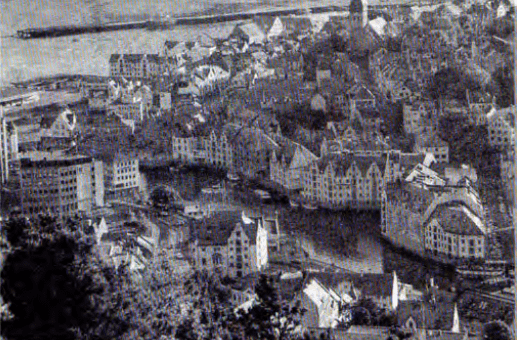
Ответ:
Norway is Europe’s sixth (1) biggest (big) country. It is wide in the south but narrow in the centre and in the north. The centre of Norway is the (2) narrowest (narrow). There are a lot of mountains and (3) forests (forest) in Norway. Summers in Norway are not hot, they are (4) colder than in many (5) countries on the continent, and the winters are (6) longer. (cold, country, long) It’ is’ very cold in the north but the rainy territories of the country in the west are much (7) warmer (warm) because of the Gulf Stream. Norway is not a poor country. Its people catch (8) more (many) fish than in other European many countries and it has oil’ in the North Sea.
Перевод ответа:
Норвегия является шестой (1) по величине страной Европы. Широкая на юге, но узкая в центре и на севере. Центр Норвегии является (2) самым узким. В Норвегии много гор и (3) лесов. Лето в Норвегии не жаркое, оно (4) холоднее, чем во многих (5) странах континента, а зима (6) длиннее. На севере очень холодно, но дождливые территории страны на западе намного (7) теплее из−за Гольфстрима. Норвегия не бедная страна. Его люди ловят (8) больше рыбы, чем в других европейских странах, и в Северном море есть нефть.
21. Use the right verb forms to complete the text. Используйте правильные формы глагола, чтобы закончить текст.

Moscow is the capital of Russia. It is (be) the biggest city in the country too. More than ten million people _ (live) there. The Moskva River _ (run) on its territory. There _ (be) a lot of universities in our capital. It _ (be) a political and business centre of Russia too. You can _ (find) many theatres, galleries, museums, parks and cinemas in Moscow.
The Russian tsar Ivan the Terrible _ (make) Moscow the capital of Muscovy in 1547. It _ (grow) up around the Kremlin, but in 1712 Peter the First _ (move) the capital to St Petersburg. But Moscow _ (be) an important city too.
In 1918, Moscow _ (become) the capital of Russia again.
Ответ:
Moscow is the capital of Russia. It is (be) the biggest city in the country too. More than ten million people live (live) there. The Moskva River runs (run) on its territory. There are (be) a lot of universities in our capital. It is (be) a political and business centre of Russia too. You can find (find) many theatres, galleries, museums, parks and cinemas in Moscow.
The Russian tsar Ivan the Terrible made (make) Moscow the capital of Muscovy in 1547. It grew (grow) up around the Kremlin, but in 1712 Peter the First moved (move) the capital to St Petersburg. But Moscow was (be) an important city too.
In 1918, Moscow became (become) the capital of Russia again.
Перевод ответа:
Москва столица России. Это также самый большой город в стране. Там живут более десяти миллионов человек. Москва−река протекает по ее территории. В нашей столице много университетов. Это также политический и деловой центр России. Вы можете найти множество театров, галерей, музеев, парков и кинотеатров в Москве.
Русский царь Иван Грозный сделал Москву столицей Московии в 1547 году. Она росла вокруг Кремля, но в 1712 году Петр Первый перенес столицу в Петербург. Но Москва также была важным городом.
В 1918 году Москва снова стала столицей России.
22. Complete the sentences with the derivatives of the words on the right. (in the brackets) Завершите предложения производными от слов справа. (в скобках)
Ответ:
1) Our new teacher greeted us warmly and began the lesson. (warm)
2) Who is the writer of this book? (write)
3) Helen is very helpful in the picture gallery. She knows so much about different painters and their works. (help)
4) I would like to go to some sunny and hot country to spend my holidays there. (sun)
5) I don’t like Mr Richardson. He is a very unpleasant man. (pleasant)
6) Yesterday in a shop I saw a very unusual souvenir. (usual)
7) Miss Debora Lincoln is my favourite teacher. (teach)
8) I don’t think we are going to have fine weather today. The sky is cloudy and it’s wet and cold outside. (cloud)
9) Little Mary can’t read very well. She reads very slowly. (slow)
10) We had a wonderful trip last month. (wonder)
Перевод ответа:
1) Наш новый учитель тепло приветствовал нас и начал урок.
2) Кто автор этой книги?
3) Елена очень помогает в картинной галерее. Она так много знает о разных художниках и их работах.
4) Я хотел бы поехать в какую−нибудь солнечную и жаркую страну, чтобы провести там отпуск.
5) Мне не нравится мистер Ричардсон. Он очень неприятный человек.
6) Вчера в магазине я увидела очень необычный сувенир.
7) Мисс Дебора Линкольн − моя любимая учительница.
8) Я не думаю, что сегодня будет хорошая погода. Небо облачно, на улице мокро и холодно.
9) Маленькая Мэри не очень хорошо читает. Она читает очень медленно.
10) У нас была замечательная поездка в прошлом месяце.
23. Use the prepositions from the box to complete the sentences. Используйте предлоги из рамки, чтобы завершить предложения.
at, by, for, from, in, into, of, off, on, out, to
1) How can I get to the railway station, please?
2) Is the airport far _ the city centre?
3) We are going to meet _ the restaurant.
4) Does your granny often go _ church?
5) We often travel _ car.
6) The taxi stopped and the young girl got _ of it.
7) What souvenirs do you usually buy _ your sister?
8) Who is sitting next _ our teacher?
9) Go straight _ and then turn left. You can’t miss the supermarket.
10) What is there _ the middle _ the room?
11) Vladivostok is _ the east of Russia.
12) We often go _ the south _ holidays.
13) London stands _ the River Thames.
14) Get _ the taxi quickly. We are late.
15) This is your station. Get _ the train, please.
Ответ:
1) How can I get to the railway station, please?
2) Is the airport far from the city centre?
3) We are going to meet at the restaurant.
4) Does your granny often go to church?
5) We often travel by car.
6) The taxi stopped and the young girl got out of it.
7) What souvenirs do you usually buy for your sister?
8) Who is sitting next to our teacher?
9) Go straight on and then turn left. You can’t miss the supermarket.
10) What is there in the middle of the room?
11) Vladivostok is in the east of Russia.
12) We often go to the south for holidays.
13) London stands on the River Thames.
14) Get in/into the taxi quickly. We are late.
15) This is your station. Get off the train, please. (В учебнике опечатка, лишнее off, именно его нужно вписать)
Перевод ответа:
1) Как добраться до железнодорожного вокзала, пожалуйста?
2) Аэропорт находится далеко от центра города?
3) Мы собираемся встретиться в ресторане.
4) Ваша бабушка часто ходит в церковь?
5) Мы часто путешествуем на машине.
6) Такси остановилось, и молодая девушка вышла из него.
7) Какие сувениры вы обычно покупаете для своей сестры?
8) Кто сидит рядом с нашим учителем?
9) Идите прямо и затем поверните налево. Вы не можете пропустить супермаркет.
10) Что там в середине комнаты?
11) Владивосток находится на востоке России.
12) Мы часто ездим на юг на каникулы.
13) Лондон стоит на реке Темза.
14) Быстро садись в такси. Мы опаздываем.
15) Это ваша станция. Сойдите с поезда, пожалуйста.
24. Which word to choose: tell or say? Use the right forms of the verbs to complete the sentences. Какое слово выбрать: tell − сказать или say − сказать? Используйте правильные формы этих глаголов, чтобы завершить предложения.
Ответ:
1) Can you tell me the time, please?
2) Yesterday John told us that he didn’t know anything about Mrs Grant and her family.
3) Your granny told me so many interesting fairy tales when I was young.
4) “Let’s meet at 5 p.m.,” said John and left the room.
5) Belly always says “So long”, she never says “Goodbye”. Isn’t it unusual?
6) Your brother told/tells me you are going away. Is it true?
7) I always tell my children to come back home not later than 10 p.m.
8) My little brother says he likes to get souvenirs.
9) Tell me, please, what cities are situated on the River Thames?
10) My parents always say they like to spend their holidays in the country.
Перевод ответа:
1) Можете ли вы сказать мне время, пожалуйста?
2) Вчера Джон сказал нам, что ничего не знает о миссис Грант и ее семье.
3) Твоя бабушка рассказывала мне так много интересных сказок, когда я был маленьким.
4) «Давайте встретимся в 5 часов вечера», сказал Джон и вышел из комнаты.
5) Белли всегда говорит «Так долго», она никогда не говорит «До свидания». Разве это нормально?
6) Твой брат сказал / говорит мне, что ты уезжаешь. Это правда?
7) Я всегда говорю своим детям возвращаться домой не позднее 10 часов вечера.
8) Мой младший брат говорит, что любит получать сувениры.
9) Скажите мне, пожалуйста, какие города расположены на Темзе?
10) Мои родители всегда говорят, что им нравится проводить свой отпуск в деревне.
25. Put the words from the two columns together to make new words or word combinations. Составьте слова из двух столбцов вместе, чтобы создать новые слова или словосочетания.
1) swimming
2) railway
3) air
4) bus
5) out
6) cinema
7) super
8) city
9) picture
10) souvenir
↓
a) shop
b) port
c) centre
d) house
e) stop
f) bridge
g) market
h) side
i) pool
j) gallery
Ответ:
1 – i, 2 – f, 3 – b, 4 – e, 5 – h, 6 – d, 7 – g, 8 – c, 9 – j, 10 – a.
1) swimming pool
2) railway bridge
3) airport
4) bus stop
5) outside
6) cinema house
7) supermarket
8) city centre
9) picture gallery
10) souvenir shop
Перевод ответа:
1) плавательный бассейн
2) железнодорожный мост
3) аэропорт
4) автобусная остановка
5) снаружи
6) кинотеатр
7) супермаркет
8) центр города
9) картинная галерея
10) сувенирный магазин

